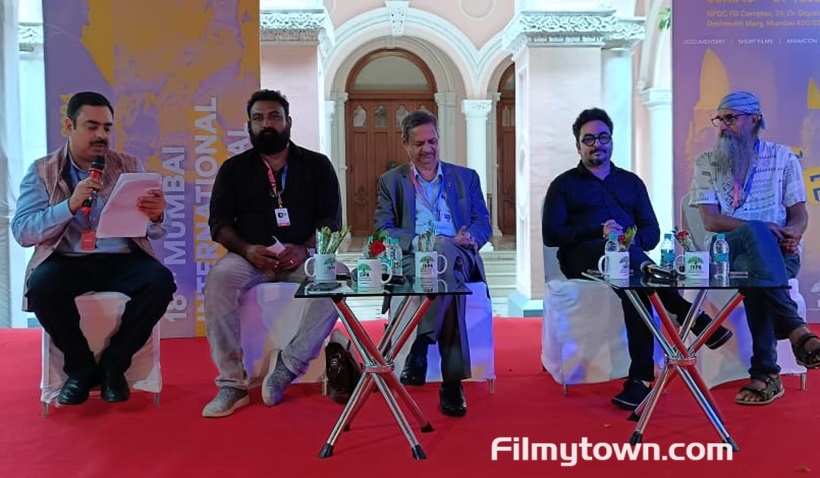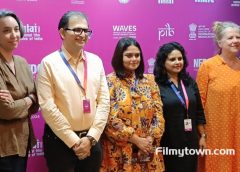A discussion by industry experts on The Magic of AI (Artificial Intelligence) in the field of filmmaking, an Open Forum organized by Indian Documentary Producers Association IDPA, a Non-Profit Organisation, was held on 17 June at the ongoing Mumbai International Film festival (MIFF) .
Senior AI industry experts spoke at length in this IDPA open forum about their vision on the implementation of AI in the movie making business and were of the opinion that AI is rapidly being incorporated in the pre production, shooting and post production departments. They were of the unanimous opinion that AI will be cutting the costs for the filmmaker in terms of organisation and also with reduced requirement of manpower during the shooting of the films.
The expert panelists invited by the IDPA who spoke at this Open Forum are Shankar Ramakrishnan, AI Expert and Senior Filmmaker from Trivandrum, Ujwal Nirgudkar, Chairman of SMTPE India & Tech Consultant from Mumbai, Sanath PC, Artificial Intelligence Consultant & Expert from Hyderabad and Sanjay Jangid, Dean Chitkara University of Design in Chandigarh. The workshop was moderated by Dr Nimish Kapoor, Researching Scientist – Deep Fake, New Delhi.
The IDPA was represented by Sanskar Desai, President and Suresh Sharma, the Vice President, Ashok Sharan, VP, General secretary Swati Indulkar and Ravindra Katyayan, treasurer of IDPA who felicitated the speakers.
Shankar Ramakrishnan has specialized in designing and executing audio, visual and digital presentation for museum Gallery is also so and creating narrative and special layouts. He is creative director and design head for Ek Myanmar Memorial Museum, Kannur and Sent Korea course alias Chavara Living Museum, Mananam Koitam Kottayam research and development field He is AI based museum installation expert.
Ujjwal Nirgudkar is a chemical engineer from UTCD Mumbai University. Now it is known as ICT and has been rocking with film industry for past 42 years. He is currently chairman of Indian section of Society of Motion Pictures and Television Engineers, New York, USA. He was awarded Fellow award by MPTE November 20, 2007 at New York for his global contribution to motion picture industry.
Ujwal Nirgudkar is the first Indian to receive US patent for film technology. First Indian appointed as director on board of International Association of Cinema and Video Labs, USA. First Indian to be invited by Oscar Academy to join in technical category 2017. He is also a member of Science Technology Council of the Oscar Academy.
He is the Chairman of SMPT Society of Motion Picture and Television Engineers and represents India in the Academy i.e. Academy of Motion Picture Arts and Sciences. The Science and Technology Council heads a committee, a global committee of 24 people.
“So definitely this when we talk about AI, the traditional AI requires patterns in data to make prediction. And there is one more thing what we called as generative AI. What is generative AI? It consumes existing data, learns from it and generates new data with similar characteristics, For example, text, images, video, audio and computer code. What we commonly know at ChatGPT, which is almost everybody knows that GPT word, you are not aware exactly. It is an acronym, it is Generative Pre trained transformer,” Says Nirgudkar.
The moderator Dr Nimish Kapoor began the discussion of IDPA with a beautiful analogy, “Of the churning of the ocean you know you have all heard about this month and this major place where the Devas and Asuras will come and the mountain is foot and a serpent Vasuki is tied around it and at one side these people will turn the ocean and magical things will come out of it. So filmmaking for me was always this process, you know, like churning the ocean of immense stories, immense data, immense characterization, immense knowledge.”
“So filmmaking at some point of time would give the best out of it, like the aid, like the Amrit, but it also gives the Kaifu at some point of time. So AI at this point of time is just an accidental discovery for most of us.”
Shankar Ramakrishnan recollected at this IDPA Open forum, “At some point of time when you visit the film set, the film set would be replete with bad words following the assistants names, people not working that thing, this thing, because there was a lot of dirty work in the sense a lot of assimilation in terms of scheduling that things not happening in the proper time. Now, those kind of things and then AI magic occurred to me when during the pre production when we had tons and tons of material to be assimilated at the touch of a single button, at the touch of a single command or a prompt, this data could be easily analyzed. This whole thing came up in a meeting where we were actually discussing what has to be done in the shoot and in no time.”
Sanjay Jangid elaborated, “So this is the technical jargon, but this is how the GPT is being generated. So what we what we in simple what is generative AI? It takes examples of existing text, audio, video and computer codes and with the help of new software generate the thing which is suitable for us. So and these commands can be different given at different levels by different people and that is how they are discussing various ways of using AI in the film industry.”
“Of course, in the documentary industry, when I talk about it in IDPA, I think the AI will be really a boon because in the traditional film industry, particularly where the big studios are in operation, they have sufficient funds to take care of many technical activity. Plus they have their marketing channels to distribute their films all over the world. But for a newcomer or particularly for a short filmmaker, it is very difficult. They are not much aware about the technical knowledge available in the industry as well as they don’t know how to market their film. So in both ways, AI will be very helpful.”
If you have a storyboard ready, the AI can decide you of what are the characters required from the story. It can identify their age, their ethnicity. If the shooting is required indoor for certain scenes or outdoor. Even the sets, particularly the virtual sets can be designed by the AI and your budgets will be saved because of lot of this. In fact you can have a set budget for a particular film and the AI will back calculate what you can do with that budget. So this.
Worldwide, there are certain parameters on which this marketing is done. In case of India, where the mobile phone and our Aadhaar numbers are very common, general, uh uh, available data from anywhere in India. If you and most of the data, the particularly the mobile number, actually, you must have already experienced that if you do a Google search for certain things, the same uh search will appear in your Facebook or you will get WhatsApp messages based on this.
I can identify who are my consumers for my documentary, in which area, which language will be used. So I can do a subtitling for that language or I can do Dubbing for that language. All these preferences will be known in advance. So it will be very easy to market your film. So this is really going to be helpful and it is going to be much cheaper for the young generation. So definitely this is going to help us.
I would say that in 2-3 years, we will talk about that what changes AI is going to make because it will be so seamlessly everywhere and it will become in our everyday things and the the processes or the things we do. So as a student, when we are dealing with students and when they are trying to generate or use the tool what we are facing the major issue is the ethical use of it.
There are some students looking at as a shortcut, while some will be really using it as enhancing what they already have in mind because AI is not right now is not having that intelligence where you know its like garbage in, garbage out. So that the what you are putting in has to be something meaningful and you need to know the system, how it works, that it what kind of results it will give you. So in such cases the elementary foundational understanding of things, let’s say in film, if you’re talking about then understanding of lightning, understanding of form, shape, color, all this has to be even become more important in these science to really know what you’re getting from the AI.
Is it meaningful? Is it something which you can use to the next level? It is not the final output, definitely, but it is you use it as a tool where you can enhance your own imagination and take to the next level.






